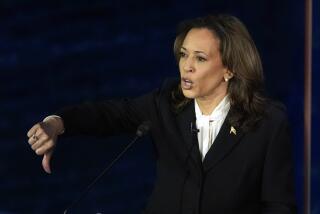Polish Regime Blames Economy’s Woes on Top Bank
- Share via
WARSAW — Buffeted by soaring unemployment and plunging popular support, Poland’s new government of former Communists is lashing out at the central bank, blaming it for stalling the economy.
“Without a substantial lowering of interest rates, there is no chance for Poland to get out from economic crisis,” Deputy Prime Minister Marek Pol declared last week. Pol charged that central bank policies “cost hundreds of thousands of people their jobs” and that “those people can now thank those who made the wrong decisions.”
The highly politicized dispute presents a new obstacle in Poland’s efforts to join the European Union. Politicians critical of the bank’s moves to fight inflation through high interest rates are threatening to restrict its latitude by stacking its policy-setting board with new members, even though central bank independence is a key condition for EU membership.
Poland is by far the biggest among former Soviet bloc countries that hope to join the EU in 2004.
Former central bank President Hanna Gronkiewicz-Waltz weighed in last Tuesday, telling reporters that during her years at the helm, “never was there an attack on the bank’s independence comparable to the present one.”
Prime Minister Leszek Miller’s social democratic government, which took office in October, argues that in order to boost economic growth and create jobs, there should be a cut this month of 4 to 5 percentage points from the bank’s current 11.5% benchmark interest rate.
Bank policymakers, who cut rates by 7.5 percentage points last year, fear that too-rapid additional cuts could trigger sharp inflation, a collapse in the value of the Polish currency and a deeper economic crisis.
The clash also has a personal element. Leszek Balcerowicz, president of the National Bank of Poland, the central bank, and head of its 10-member Monetary Policy Council, is a former finance minister widely viewed as the architect of the nation’s post-Communist economic reforms. He has won praise from foreign analysts and governments but is hated by many Poles who have lost jobs or suffered reduced purchasing power in the transition to a market economy.
A composite photo published Thursday in Super Express, a mass-circulation tabloid, shows two martial artists bearing the patched-on faces of Miller and Balcerowicz, with the grim prime minister delivering a kick toward his bespectacled opponent’s resolute face. The headline reads: “The Rate Duel.” The humor is compounded by an implied Polish pun; the word stopa means both rate and foot.
Miller and five top ministers held a highly publicized but inconclusive meeting with Balcerowicz and other bank officials Wednesday.
“We have not come here to negotiate the level of interest rates because that is not within the framework of the constitution,” Balcerowicz said before the meeting. “We have come here in the highest interest of the country to stop the dangerous process of confrontation, which was not started by us.”
After the talks, central bank officials skipped what had been planned as a joint news conference, but Finance Minister Marek Belka called it “a good and useful meeting.”
Many respected economists argue that the central bank might have been wiser to cut rates more rapidly last year. They blame its policies for contributing to a fall in economic growth to 1% last year compared with 4% in 2000, and a jump in unemployment to nearly 17%, the highest level since the 1989 collapse of communism. About 3 million people were out of work in November.
But the government’s heavy-handed attempts to pressure the central bank have drawn criticism and even ridicule, as well as warnings that an all-out confrontation could only damage Poland’s interests.
The conflict has become so bitter that cooperation will not come easily, Rzeczpospolita, a leading newspaper, said in an editorial. “Ten financial wise men [the bank’s policy council] think that they have become whipping boys, and that the government’s conflict with the council is a smoke screen to hide its lack of an economic program,” it wrote.
Miller has stressed repeatedly that he inherited a dismal economic situation from the center-right coalition that was ousted in September elections. But critics charge that his government is trying to escape blame for failing to fulfill promises to boost growth and cut unemployment.
“The strategy of the new government was first to blame the former government,” said Andrzej Rychard, a sociologist at Central European University in Warsaw. After three months in office, “it might be the case they are looking for new suspects to be blamed for the current state of the economy.”
A survey by the respected OBOP polling agency published last week showed that 51% of respondents felt that the government was not keeping its election promises, while just 19% said it was keeping them. As for the government’s effectiveness, 38% said it was worse than they had hoped, and 11% said it surpassed their expectations.
Miroslawa Marody, a sociologist quoted in Gazeta Wyborcza, the country’s largest-circulation newspaper, compared the government’s attitude to that of a plumber who comes to repair bathroom fixtures that were dismantled by another worker. Instead of getting to work, he spends three months complaining what a mess his predecessor left--and promising that the leaks will stop when EU membership is achieved.
Prominent commentator Rafal Ziemkiewicz wrote in Rzeczpospolita that the government didn’t expect “its statements aimed at simple folk” pressuring the bank “would be taken seriously by foreign investors and high officials of the European Union.”
“Since the independence of the central bank is a standard recognized worldwide,” he added, “Leszek Miller’s government suddenly found itself criticized by those whose opinion it really values.”
Ziemkiewicz argued that the government now has little choice but to seek “some compromise allowing it to get out of this affair without losing face.”
More to Read
Sign up for Essential California
The most important California stories and recommendations in your inbox every morning.
You may occasionally receive promotional content from the Los Angeles Times.













